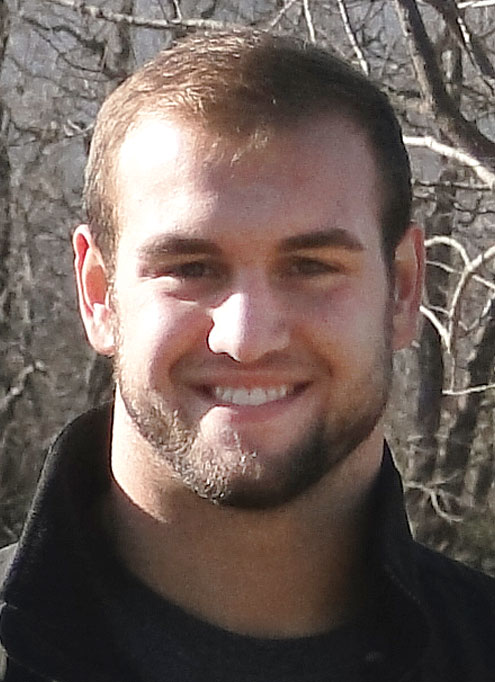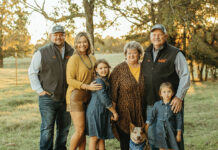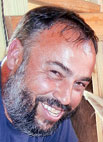
For Logan Genz, now a senior at Arkansas Tech University in Russellville, Ark., leaving for college and being away from home were more important in determining his future then simply starting college.
Logan is a gifted athlete, earning his agribusiness degree on a football scholarship. He even won the Defensive Player of the Year in the Great American Conference for 2015. When Logan arrived at college, he fully expected to earn a degree in teaching physical education as an initial step toward becoming a football coach. What actually happened was homesickness.
Logan remembered trail riding on his pony, Stormy, when he was so young the pony had to be tied to someone else to lead her. He remembered his dad Jerry always thinking he and his brother Taylor were older and bigger than they were and struggling to push unwilling calves into trailers. He remembered he and Taylor straining to get square bales loaded onto a trailer. Much to Logan’s surprise, the call of those memories was stronger than the allure of football.
Nonetheless, football was far more than a means to an agricultural future. Logan said, “Being a student athlete requires learning how to set priorities, how to put responsibility and focus before anything else with far less time than the average student for a social life.”
Not surprisingly, that dedication and determination has paid off.
Attending a career fair on campus was a class requirement recently, but little did he know it would lead him to his future.
“If students don’t attend, companies won’t come back so I dressed up in a suit and tie and tried to act interested,” Logan said.
Then the career representative from Tyson Foods and a Arkansas Tech alumnus approached Logan, asked his GPA and proceeded to explain to the graduating athlete his own journey through Tyson.
“The experience was strange,” Logan recalled. “He never asked me any specific questions but seem to know everything about me personally. I never gave him a resume, and he never even asked an interview type question, just my GPA. Then, amazingly, he offered me a position as an operational associate-manager in training.”
As part of his agribusiness degree with an animal science option, Logan wrote a business plan for a farm and made it as realistic and applicable to the family commercial cattle operation back home in West Fork, Ark., as possible. An important consideration was that his father and brother both have off the farm jobs, as will Logan.
The Genz farm consists of 500 owned and leased acres that supports 60 head of cattle.
“Because we have an abundance of land, we use rotational grazing and move herds according to weather conditions, sometimes waiting until as much as 80 percent of the grass is consumed,” Logan said. “We do not currently seed, but I foresee us moving toward seeding ryegrass and orchard grass.”
Logan loves to have silage, but understands their land is not suitable for corn.
The farm uses sanitation facility-produced fertilizer. Microbes break down waste by consuming excess nitrogen and making other nutrients more assessable. The Genz’s broadcast spray for weeds and spot spray for thistles.
“Equally important for weed control is rotational grazing, which helps manage weeds especially in the spring when weeds are more digestible and palatable with higher protein content,” Logan said.
He also said adding more copper to their mineral program to help with reproduction rates could help adjust for the general copper deficiency in Arkansas soil without endangering their livestock. Higher copper concentration is toxic for other livestock like sheep and goats. Off-the-farm jobs makes purchasing hay rather than raising it sensible, both in terms of time and equipment costs.
The Genz farm prefers Balancers bred by a registered Balancer bull. The Angus influence provides the commercially preferred black coloring while the Gelbvieh genes provide more muscling and higher weaning weights. Further, the combination adds natural disease and parasite resistance.
One management adjustment Logan would like to see is annual bull testing for soundness and fertility because a recent bull purchase of an untested animal proved very costly. Logan foresees preg checking all cows and instituting rigorous culling in order to move toward predominantly fall calving.
“The advantage is we can sell when the market is generally stronger,” Logan said.
Logan married his childhood sweetheart, Jill, in the summer between his junior and senior years of college. Jill is pursuing a degree in management marketing and will graduate next December.
The couple began dating when Jill asked Logan to attend a Halloween party at her house at her mother’s insistence.
“I told her she can’t complain about my husband because she picked him out,” Jill said. “We want to return to the West Fork area because both of our families as well as good professional opportunities are in the immediate area.”







